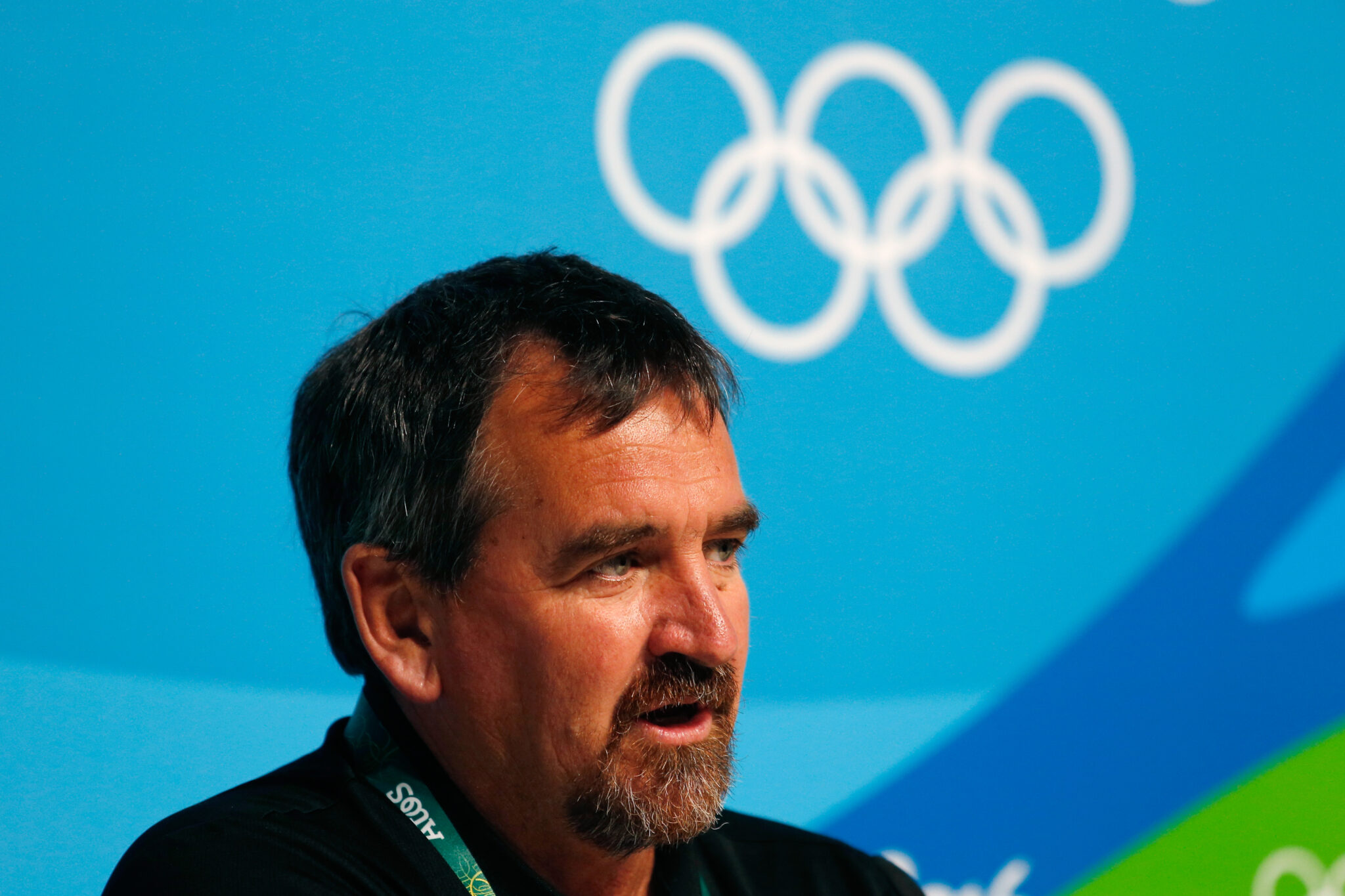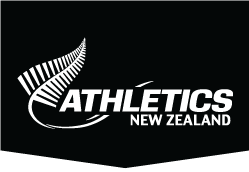News & Updates
Scott leaves a proud legacy at Athletics NZ

Scott Goodman pictured at a Rio 2016 Olympic Games press conference. (Credit: Matt Hazlett/Getty Images).
Outgoing Athletics NZ High Performance Director is moving on to a new role as Director of Performance Coaching with Athletics Australia. Steve Landells chats to Scott to discuss his legacy and his life and times in the pivotal position.
After serving for more than a decade in the role of Athletics NZ High Performance Director, Scott Goodman looks back with pride on his significant contribution to the organisation.
The Australian native made a positive impact in a range of key areas – developing coach education, overseeing the integration of the para programme and also helped bring about a greater overall depth to an increasingly vibrant high performance programme.
Taking up his new role in Australia for family reasons he leaves New Zealand with a heavy heart but with a treasure chest of many happy memories from his time in Aotearoa.
Scott began his professional life as a PE teacher in special schools in Tasmania before taking up a position in Canberra as the National Coaching Co-ordinator for the Disabled (NCCD) in the early 1990s – where he worked in sport to develop materials to encourage coaches to work with people with a disability.
Over time he developed a specific interest in Para athletics and was appointed co-ordinator of Para Athletics in Australia in the mid-90s before this role transitioned into Athletics Australia Paralympic Programme Manager from 2000-2010 – where he oversaw several successful Paralympic Games for the Australian team.
Scott had previously travelled to New Zealand on several occasions and enjoyed his experiences so when he was encouraged to apply for the position as High Performance Director at Athletics New Zealand in 2011 he didn’t hesitate.
“I’d had some health challenges in 2010 and taken some time off,” explains Scott. “It was around that time the job was advertised, some people thought I should put in an application, and I was lucky that Scott Newman (then the CEO) appointed me to the role.”
While acknowledging many similarities in the way the sport was funded and governed between Australia and New Zealand, Scott recalled that on his arrival the most noticeable difference was in coach education.
“The coach education structure has across all NZ sports seemed to have stalled during the 2000-2010 period”, he explains. “I don’t know why that had been the case, but it is fair to say there was some resistance within the athletics coaching community against Athletics NZ and HPSNZ, who at that time were starting to fund elite athletes”.
“In 2011 other than at a couple of clubs there were no employed coaches. At that point the HP system was just starting to evolve and was probably 10-15 years behind Australia, who had enjoyed a big injection of money in this area in the lead up to the Sydney Olympic and Paralympics.”
For the first couple of years in the role, Scott spent a lot of time with coaches listening to their concerns. While never promising what he could not deliver he continued to listen, providing information where necessary and greater clarity around selections and the philosophy of ‘a top 16 approach’ to selecting teams.
Over the past ten years the opportunities for paid coaching positions within the organisation has now grown to include 12 employed fulltime or part-time coaches and the coach education programme has developed significantly under the guidance of Coach Education Manager, Kirsten Hellier.
Besides the advances of coach education there little doubt high performance standards have also improved markedly under Scott’s watch. On the able-bodied side, the New Zealand team enjoyed some success at the London Olympics with Dame Valerie Adams winning gold and middle-distance runner Nick Willis, decathlete Brent Newdick and javelin thrower Stuart Farquhar claiming top 12 positions.
However, by the time of the 2016 Rio Olympics, New Zealand enjoyed a dream Games claiming four medals courtesy of a shot put silver for Dame Val and bronze medals for Nick, Tom Walsh and Eliza McCartney. More success followed at the Tokyo Games with bronze medals with Tom and Dame Val and top 12 finishes for shot putters Maddison Wesche and Jacko Gill, high jumper Hamish Kerr and hammer thrower Julia Ratcliffe.
Yet Scott acknowledges the seed for this success was sewn prior to his time at Athletics NZ.
“Before I got here Terry Lomax and my predecessor Kevin Ankrom made the decision to target certain event groups which appealed to me,” explains Scott. “The main event group was throws, which is where we’ve got our greatest depth and we’ve employed coaches and invested in young coaches through HPSNZ support. Our results over recent years provide evidence that this investment approach has been successful, and we’ve seen the development of the likes of Maddison, Connor Bell, Lauren Bruce and Tori Peeters joining our traditional stars Tom, Jacko (Gill) and Valerie.
“We also made the decision, given New Zealand’s tradition, to focus on distance as a targeted area led by Nick Willis and we also invested in pole vault primarily around Jeremy McColl’s training group in Auckland. We’ve obviously seen the emergence of Eliza McCartney, who won a medal in Rio, but we’ve seen the emergence of other vaulters such as Imogen Ayris and Olivia McTaggart, who are on the brink of making senior global teams and James Steyn in the men’s pole vault also is close as well.
“Hamish Kerr has developed with some good young high jumpers behind him as well, so we are also looking at high jump as a targeted event in the Paris cycle.”
Given Scott’s background in Para athletics, he naturally also had a keen interest in the Athletics NZ para programme. On arrival he was pleased with the work carried out by Raylene Bates and a big decision was made, prompted by Scott and supported by others, for Athletics NZ to include para-athletics into the overall programme “a big first for sport in New Zealand.”
Since then, full-time para-athletics coaches Raylene Bates and John Eden have been recruited while traditional coaches of able-bodied athletes such as Brent Ward have developed an extremely successful coach-athlete relationship with two-time Paralympic long jump champion Anna Grimaldi.
“We have targeted the best para-athletes and the best people to coach them. That is the message we are trying to get across,” he adds.
The focus on para-athletics has paid huge dividends. Inspired by Liam Malone’s triple medal haul (two gold, one silver) New Zealand won nine medals at the Rio Paralympics – up from the one solitary medal won at the London Paralympics. Success was maintained in Tokyo as the team secured a further seven Paralympic athletics medals.
Scott also looks back with pride on the work Athletics NZ has made in Child Protection. He says on his arrival the New Zealand system around police vetting and the annual code of conduct ethics updating was significantly behind many other countries, however Athletics NZ as an organisation has made huge progress in this area.
“I feel now we are a lot better structured and set up as an organisation to look after the well-being and protection of young athletes,” he adds.
At the helm for more than a decade, Scott leaves the role with many great memories, but does he have any personal highlights?
“I have so many,” he adds. “Liam Malone and how that evolved was just incredible,” says Scott. “While I also remember the 5000m at the Glasgow Commonwealth Games when three New Zealanders broke away with three Kenyans with two laps to go to contest the medals. It was a highlight but also a lowlight after Nick Willis and Jake Robertson both tangled and brought each other down, although Zane pushed through to spook the Kenyans to win bronze.
“I also fondly remember being in the grandstand when Eliza McCartney caught up with her family on the stairwell at the Rio Olympics after she won bronze. Some of those personal moments will live long in the memory.”
There is little question New Zealand will always have a very special place in Scott’s heart and he praises the role of so many great staff he has worked with including Scott Newman, Kat Austin, Raylene Bates, Terry Lomax, Dale Stevenson and Tim Driesen as well as countless others.
He leaves with no regrets from his time as Athletics NZ High Performance Director and is optimistic for the future of the sport here.
“My wish going forward is we can win four medals at the Paris Olympic Games and eight to ten medals at the 2024 Paralympics,” he says. “I would like to see the para team grow to be consistently 12 to 15 athletes and for the able-bodied team to have a team size of 14-18 athletes at major championships. We have increased the depth and quality of athletes and the likelihood of having people capable of challenging the podium places.”
